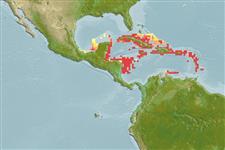>
Gobiiformes (Gobies) >
Gobiidae (Gobies) > Gobiinae
Etymology: Evermannichthys: From Evermann, 1902, researcher about fauna + greek, ichthys = fish (Ref. 45335).
More on author: Hubbs.
Environment: milieu / climate zone / depth range / distribution range
Ecologia
marinhas demersal. Tropical; 24°N - 12°N
Western Central Atlantic: Florida and the Bahamas to Curaçao.
Tamanho / Peso / Idade
Maturity: Lm ? range ? - ? cm
Max length : 3.0 cm SL macho/indeterminado; (Ref. 92840)
Espinhos dorsais (total) : 9; Raios dorsais moles (total) : 27; Espinhos anais: 0; Raios anais moles: 11. Distinguished by having the following characteristics: thin and elongate in form; reduced scale cover and head pores; depth of body about 2 mm (Ref. 92840).
Obligate sponge dwellers. Live deep within canals of the sponges, near the openings to the incurrent canals. Sponges provide species with protection from predators and an available food source in many invertebrates. Eggs found within sponge or small plankton brought through incurrent pores (Ref. 92840).
Life cycle and mating behavior
Maturities | Reprodução | Spawnings | Egg(s) | Fecundities | Larvas
Böhlke, J.E. and C.C.G. Chaplin, 1993. Fishes of the Bahamas and adjacent tropical waters. 2nd edition. University of Texas Press, Austin. (Ref. 5521)
Categoria na Lista Vermelha da IUCN (Ref. 130435)
Ameaça para o homem
Harmless
Utilização humana
Ferramentas
Relatórios especiais
Descarregue XML
Fontes da internet
Estimates based on models
Preferred temperature (Ref.
123201): 27.1 - 28.2, mean 27.8 °C (based on 300 cells).
Phylogenetic diversity index (Ref.
82804): PD
50 = 0.5312 [Uniqueness, from 0.5 = low to 2.0 = high].
Bayesian length-weight: a=0.01023 (0.00477 - 0.02194), b=3.02 (2.84 - 3.20), in cm total length, based on LWR estimates for this (Sub)family-body shape (Ref.
93245).
Nível Trófico (Ref.
69278): 3.1 ±0.3 se; based on size and trophs of closest relatives
Resiliência (Ref.
120179): Elevada, tempo mínimo de duplicação da população menor que 15 meses (Preliminary K or Fecundity.).
Fishing Vulnerability (Ref.
59153): Low vulnerability (10 of 100).
